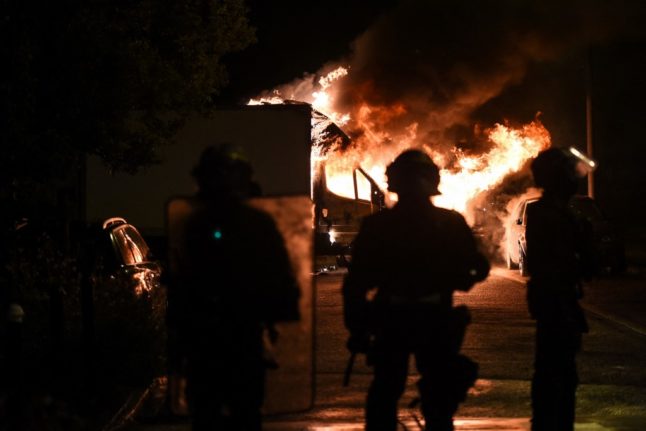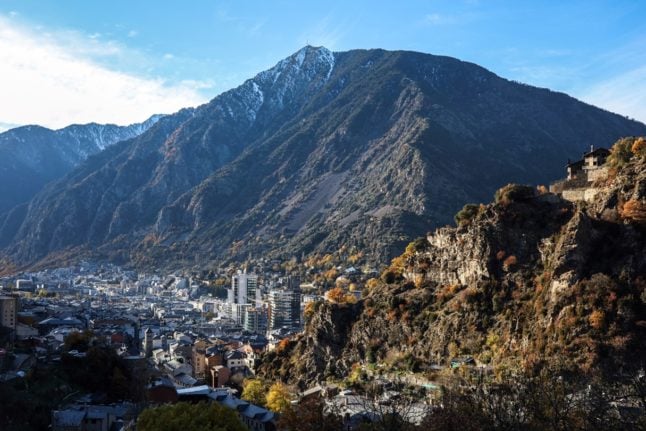In 2005 France was rocked by three weeks of rioting that began in the Paris suburbs and spread across the country.
The spark for the riots was the death of two young boys at the hands of police – Zyed Benna and Bouna Traoré, who died after being chased by police into an electricity substation – but the wider complaints were police violence and a sense of alienation and exclusion of people who live in France’s low-income, multi-racial suburbs.
Fast-forward 18 years and riots have again rocked France, also sparked by the death of a young man – Nahel M, aged 17, who was shot by police during a traffic stop.
So, has anything changed? And will anything change?
Social changes
Political expert and veteran France reporter John Lichfield told us: “I did a lot of reporting from the banlieues in 2005 after the riots and I went back a year or so later to the north Paris suburbs where they started.
Hear John and the team from The Local discuss these issues in the latest episode of the Talking France podcast. Download here or listen on the link below
“And back then the state of the housing, the state of the transport links, the opportunities for jobs were miserable – you could see what the background for the riots was and the sense of rejection and alienation.
“On a practical level, a lot has changed since then. The transport links have been much improved (hence the number of trams and buses that were burned in the recent riots) job opportunities have maybe improved as well because generally speaking unemployment has reduced in France and huge amounts of money has been spent on the banlieues in the last few years.
READ ALSO 7 films to help you understand French riots
“But there are problems that remain. I think there are two main things; there is a sense among some – although not all – kids in the banlieues that they will never be accepted as French, they are always being rejected or treated as inferior citizens of this country.
“And secondly the police – there is a constant reminder for these kids that they are regarded as inferior because of the way the police treat them.”
OPINION Riots could become France’s most dangerous crisis in decades
Policing changes
While wider social issues of racism and social exclusion are undoubtedly a problem – and not only in France – the immediate spark for the riots was police behaviour.
The initial police account stated that 17-year-old Nahel refused to stop for police and the officer fired in self-defence. Then mobile phone footage emerged that showed that in fact the car was stationary and the officer shot the teenager at point blank range through the window.
In 2022 13 people were killed by police after they reportedly refused to stop, the majority of them young men of colour. A wider problem of violent and racist behaviour from police – often revealed through camera phone footage – has been present for decades.
At a march in memory of Nahel, a 16-year-old boy told AFP: “It’s always the same people who are targeted, blacks and Arabs, working-class neighbourhoods. They kill a 17-year-old boy like that, for nothing; this death makes us hate.”
At the same event, campaigner Assa Traoré – whose brother Adama died at the hands of police – said they were marching for those “who didn’t get a video” – referring to the video that exposed the police officer’s lie about the circumstances of the shooting.
READ ALSO 7 times videos have revealed police violence in France
But while an increasing number of such videos have exposed violent behaviour from police, both police leaders and politicians remain reluctant to examine systemic problems.
One of France’s largest policing unions released a statement that referred to the rioters as “vermin” with whom they were “at war” while the the government rejected calls from a UN spokesman to examine “deep-rooted racism within the French police”.
It therefore appears unlikely that any kind of meaningful changes will take place within French policing itself – a system in which the youngest, least experienced officers frequently find themselves patrolling the toughest and most crime-ridden areas of France.
John Lichfield said: “The police have a difficult job in dealing with huge amounts of crime and drug trafficking and gang violence – in which 17-year-old boys are frequently killed by other 17-year-old boys.
“It’s a complicated situation but without a big change in the attitudes of the police and education into the issues of the banlieues I fear that these type of riots is something that is going to happen every generation.”
Political change
On Tuesday at the gathering of local mayors, Emmanuel Macron said that he hopes to “start the painstaking, long-term work needed to understand the deeper reasons that led to these events.”
His immediate reaction was more short-term, including blaming social media and video games “that have intoxicated” the rioters, as well as parents for failing to keep their kids off the streets.
Political scientist Fatima Ouassak, co-founder of the Front de Mères (Mothers’ Front), an organisation of parents of students from working-class areas, said: “The most important thing is to give hope to our children, that they believe in their future. I am afraid that there will be another death.”
READ MORE: Death of Nahel brings old problems in France’s suburbs back to the surface
In the short-term, the government policies announced are to deal with the immediate problems – such as funds to help with the rebuilding of damaged areas.
There are currently no plans for any inquiries into French policing, despite the call from the UN human rights office for the country to “seriously address the deep issues of racism and discrimination in law enforcement.”
Macron has acknowledged the wider problems before, in 2020 when proposing a new bill to crack down on Islamic separatism, he said: “We have created our own form of separatism. We have created districts where the promises of the Republic are no longer kept.”
Since then, however, the issue had receded into the background until the most recent riots.
But any such attempt to tackle the long-term problems will be hampered by both Macron’s lack of an overall parliamentary majority and the deep political divide evident in France. From the far-left leaders who refused to even condemn the violence of the rioters to the far-right who exploit the riot to spread fears of “foreign hordes”, finding meaningful solutions will be tricky.
Macron is expected to make a TV appearance in the coming days where he is expected to try and find common ground between all sides.
John Lichfield said: “Good luck with that”.



 Please whitelist us to continue reading.
Please whitelist us to continue reading.
The usual John Lichfield………….